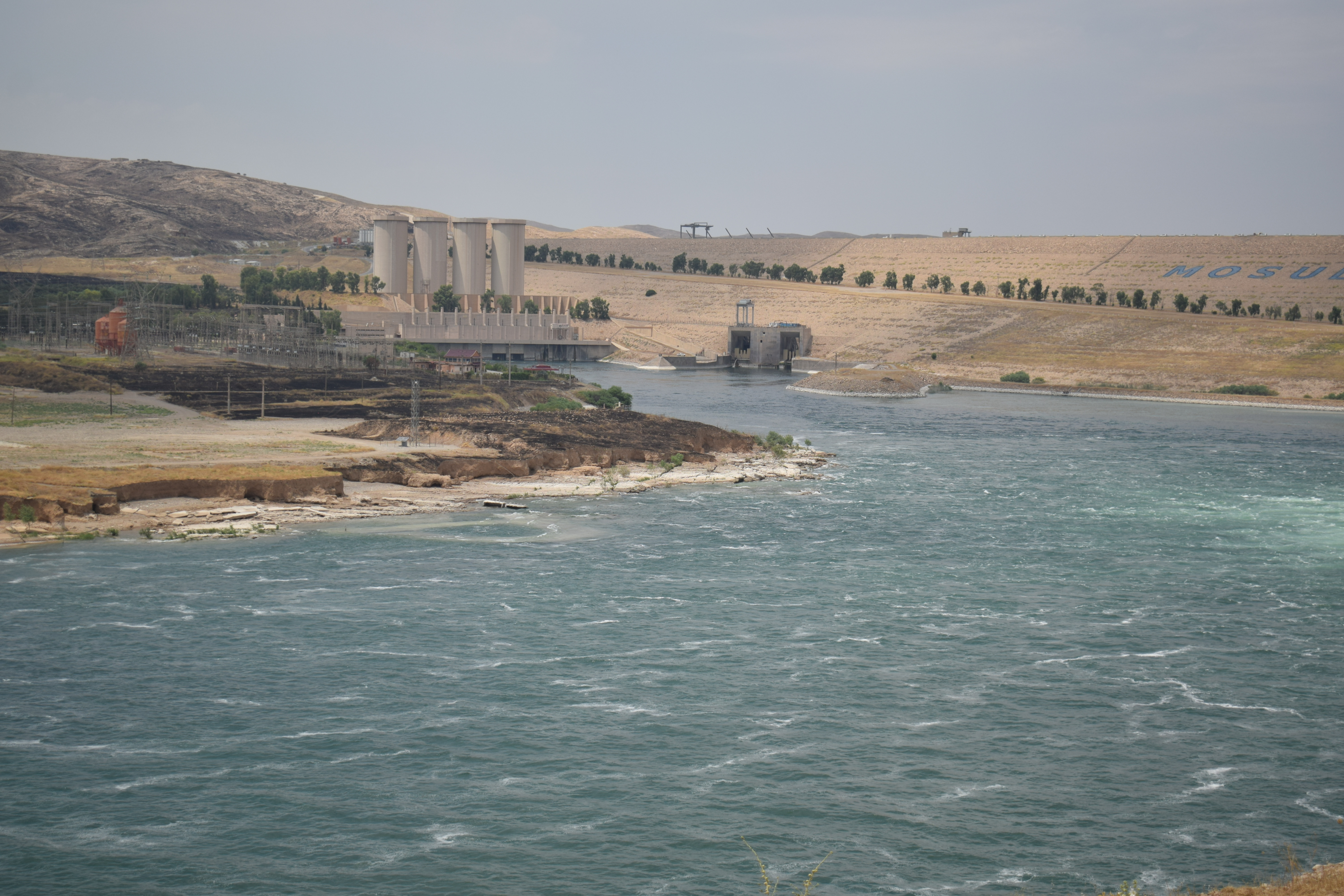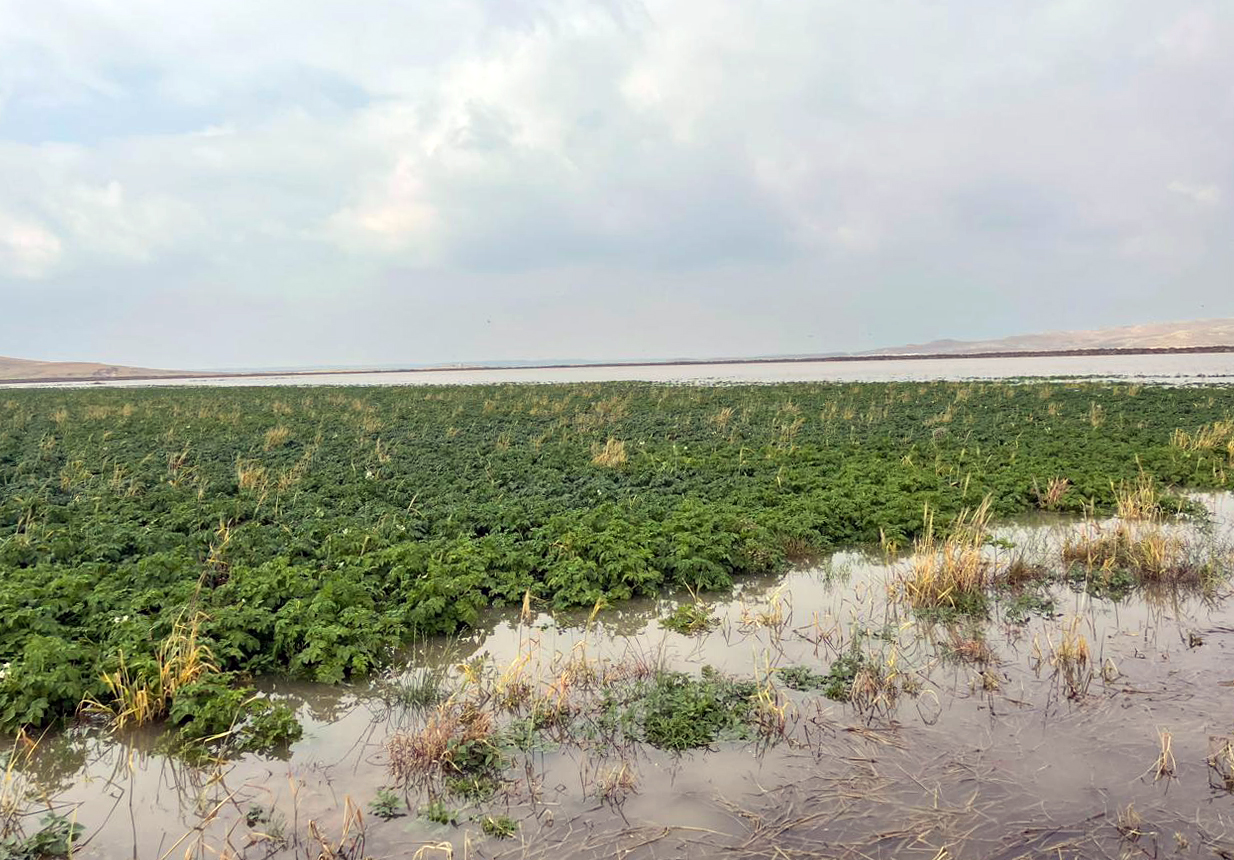Dozens of farmers reported heavy losses due to the discharge of Mosul Dam in Nineveh Province which suddenly increased from 700 cubic meters to 1,000 cubic meters per second, after the dam’s water level rose as a result of the heavy rain wave that Iraq witnessed since the beginning of May, as the percentage of rain at Mosul within a few days reached 50 mm, according to meteorology statistics.
Turkey also increased the discharge of Tigris water into Iraq, according to the Ministry of Water Resources, in a step related to an agreement concluded between the two countries during the last visit of Turkish President Recep Tayyip Erdogan to Baghdad last April.
“We planted potatoes on a land area of 100 dunums (10 hectares), two kilometers from the dam. There is only about a month left until the harvest begins. Still, the rise in the water level of the Mosul Dam led to the submergence of half of the land area,” said Sagvan Idris Ali, a farmer from the Sumel district of Dohuk Northern Province.
According to the follow-ups of the (KirkukNow) correspondent, approximately 30 farmers from Sumel and Batil sub-district, affiliated with the independent administration of Zakho, planted about 50 hectares near the Mosul Dam, and each of them incurred losses estimated at more than 10 million Iraqi dinars IQD (USD7,000) each.
Ali says that the water level of the Mosul Dam rose “suddenly,” and they did not expect it to reach a level that would cause them harm. This was while the river police in Nineveh had warned boat owners and tourist facilities on the banks of the Tigris River a few days ago about the increased discharge of the dam’s water.
Two weeks ago, Ali and several other farmers have built berms near their agricultural lands to prevent river water from reaching them.
“The water level rose dramatically and submerged three rows of berms. If the water had submerged the fourth berm, we would have lost our entire crop,” according to Ali.
His land contains about 150 tons of potatoes and, according to him, he has incurred losses estimated at millions of dinars.
Nineveh Governorate is considered the first province in Iraq in potato production. Almost 3,000 hectares were planted with potatoes and production hit 124,000 tons, according to statistics from the Central Bureau of Statistics for 2022.
Over 5,000 hectares were cultivated with potatoes throughout Iraq and production exceeded 270,000 tons in 2022, according to the Central Bureau of Statistics for 2022.

Mosul Dam is about 50 km northwest of Mosul, center of Nineveh province, 2019. Ali Ayad
The crops of dozens of farmers were damaged after the discharge of surplus water from the Mosul Dam, causing the submergence of tens of hectares of agricultural land.
“I rented agricultural land of 100 dunams for 800,000 dinars per dunam, and planted it with potatoes, most of which were submerged by the dam’s waters,” Ismail Haj Musa, a farmer from Batil sub-district, told KirkukNow.
Ismail stressed that "the dam's water level has not reached this level in 15 years."
According to statistics from the Ministry of Water Resources, the water level of the Mosul Dam increased by 10% percent during April, and the dam’s storage capacity is 11 billion cubic meters.
Despite the challenges posed by climate change and government routine, farming remains a vital sector of Iraq’s economy, providing livelihoods for millions of Iraqis and ensuring part of the country's food security.
About one-eighth of Iraq’s total area is arable, and another one-tenth is permanent pasture. A large proportion of the arable land is in the north and northeast, where rain-fed irrigation dominates and is sufficient to cultivate winter crops, mainly wheat and barley.
In 2022, the Ministry of Agriculture exported more than 30,000 tons of potatoes to the Gulf Countries GCC, yet has not suspended importing it from neighboring countries.
A source from the Batel Sub-district Agriculture Department anonymously told KirkukNow the lands near the dam “were planted with potatoes illegally, as cultivation on these lands is prohibited,” because as the dam’s water level increases, these lands will be submerged, especially the lands of the village of Kharab Demi in the Batel sub-district, Kamuna, and several other areas within the borders of the Khanki sub-district of the Sumel.
“The farmers informed us about the losses they suffered and we will follow up on the matter,” according to the source, who did not guarantee compensating those affected.
Mosul Dam is the largest dam in Iraq and the fourth largest in the Middle East. It is located on the Tigris River, about 40 kilometers north of Mosul. It was built in 1986 by a German-Italian company, valid for 80 years, 3.2 kilometers long, and 131 meters high.





